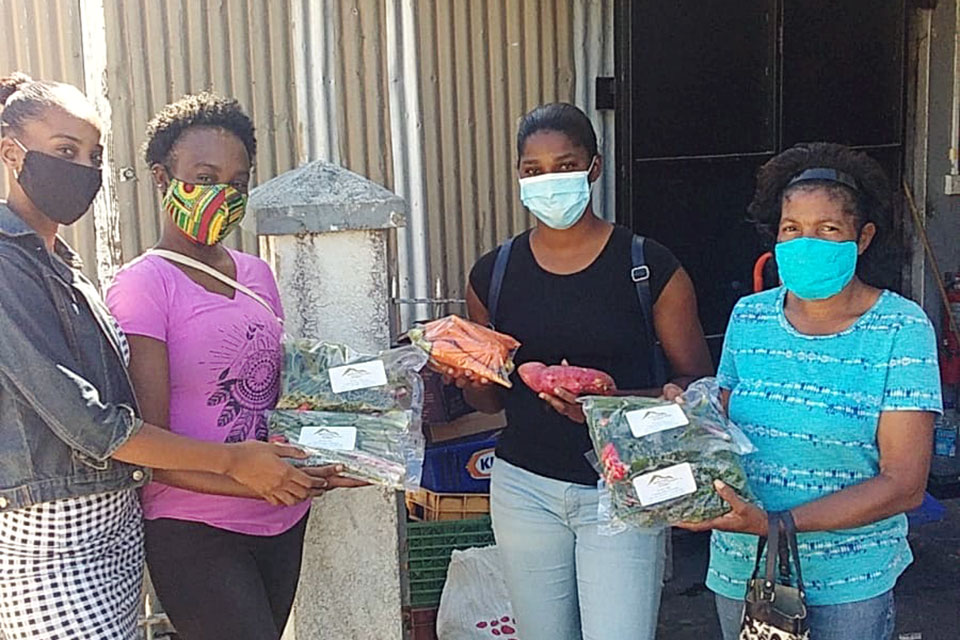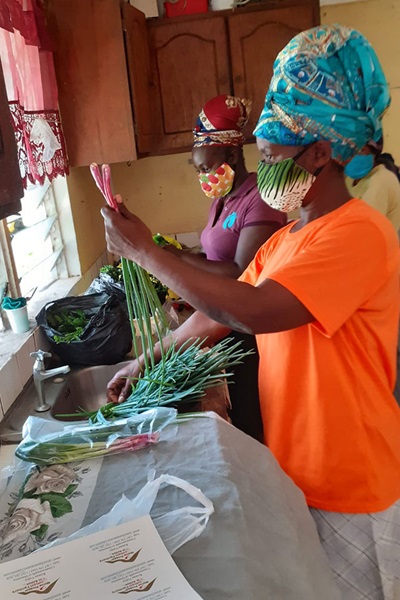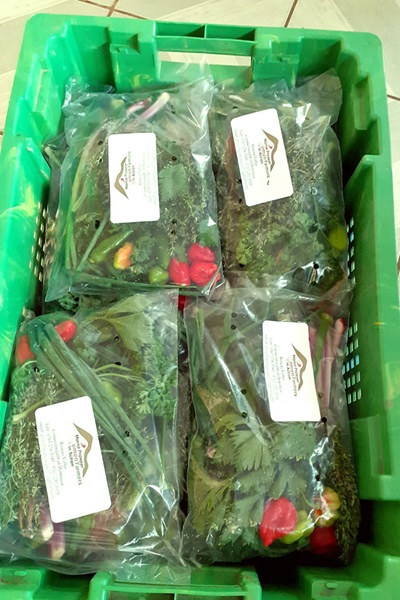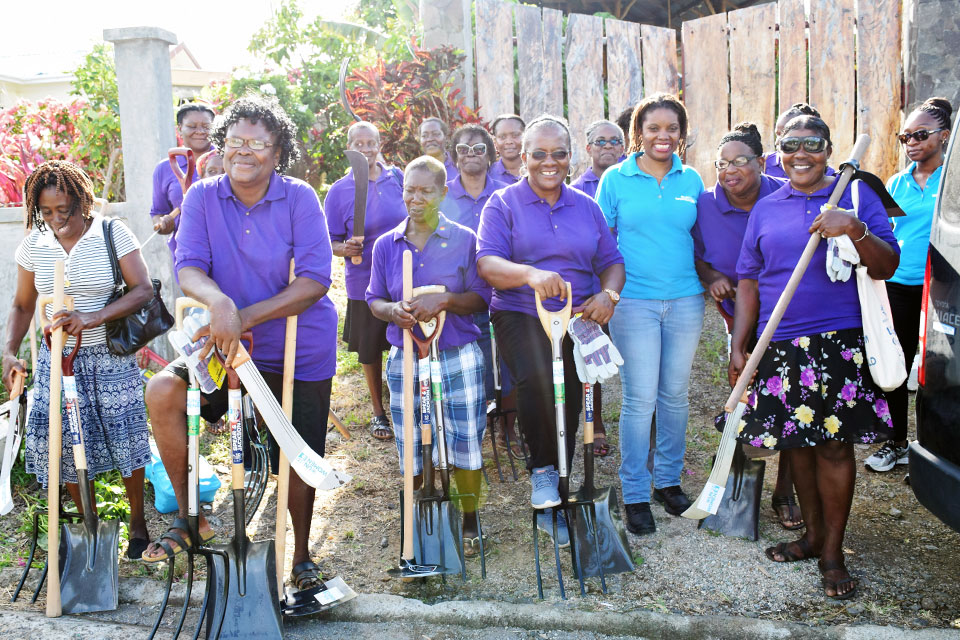Cultivating change: women farmers in Dominica find new paths to market amidst COVID-19 shutdowns
Women farmers have recently suffered significant loss of income as a result of overlapping disasters. This case study explores how women farmers are being connected to new outlets and market opportunities and supported to do more business online.

In Dominica, women smallholder farmers’ fields and gardens are full, and their storerooms are piling up quickly. With markets and restaurants closed due to COVID-19 lockdown measures, farmers have few opportunities to sell, leading to surpluses of fresh produce and shortages of money to pay the bills.
“All of us have been affected by COVID-19. We have a lot of things in our gardens that we cannot sell. We cannot sell at the market, and the supermarkets take less than they used to. We need money to pay the bills. We have to provide everything for ourselves, ” explained a woman farmer during a conversation with UN Women.

The women farmers’ points of sale were nearly eliminated by measures to reduce the spread of the new coronavirus across the small island nation. Initially, produce markets were closed due to weekend curfews, and supermarket and restaurant sales were also interrupted. Port closures meant that they could not sell to the fresh produce exporters; and selling directly to individuals and cash transactions were risky, as the farmers feared getting infected.
Without safe avenues to sell their produce, crops were left to rot—a whole season’s work gone without any profit.
The loss of income has been particularly hard to shoulder for the women farmers of Dominica as they were just beginning to regain their financial footing after Category 5 Hurricane Maria tore through the island in September 2017. The devastating storm had wiped out their crops and destroyed their equipment, tools and infrastructure.
The women’s fight to recover their land and livelihoods had been an arduous journey, and now, the COVID-19 crisis poses a major setback to their progress.
To support the women farmers during this crisis, UN Women has re-oriented its project, which initially intended to establish a seed bank to guard against future disasters. The project will now temporarily pivot to connect farmers from four groups – the Morne Prosper, Bellevue Chopin, North East Women Farmers’ group and Warner Farmers Producers Inc. – to new outlets and market opportunities.
Part of the strategy includes the development and distribution of a weekly inventory of produce so that retailers and individuals can place orders directly with the farmers.
As a start, the supermarket, Lindo Mart, has placed orders with one group of women farmers for seasonings, fresh vegetables and fruits.

Priscilla Jean Jacques, a farmer for over 20 years and a member of the Morne Prosper group, said, “When I saw Morne Prosper women farmers advertising on the Lindo Mart website, I felt so proud. I just pray to God it opens the door for more business.”
Jacques explained that the 22 members of her women’s group grow essential seasonings, which are always in high demand.
They have begun packaging and labelling their products at home because construction of their factory has stalled because of COVID-19 lockdown measures.
Vanessa Julien, Coordinator for Warner Farmers Producers Inc., agrees that the project is already making a difference. “I am a sweet potato farmer. Lindo Mart does not normally buy sweet potatoes, but because of the project, they are trying to assist us. Now I have a market,” she shares. “Based on the sales, they may take a larger quantity next week.” The early success of the project has encouraged her to plant other crops.
Dawn Francis, coordinator of the UN Women project, shared that the project has also created an opportunity for a young woman entrepreneur, Callister Sango. Sango is advertising the women farmers’ produce and their contact information on her online platform, AgriVertise, and on her Facebook page. As a result, the farmers have received more fresh produce orders via the online platforms.
To help them keep up with the digital demand, UN Women has sponsored cellular data credits so that they can do more business using their cell phones.
“UN Women is pleased to support Dominica’s women farmers during this challenging period,” said UN Women MCO Caribbean Programme Specialist Isiuwa Iyahen. Before the COVID-19 crisis hit, smallholder women farmers in Dominica and other Caribbean nations had to live with the constant threat of disasters (primarily hurricanes) and negative impacts of climate change.
“With many of these farmers still recovering from Hurricane Maria, they now have to contend with the existential threat of the COVID-19 pandemic. Given the border closures and interruptions in global supply chains, this pandemic reminds us of the importance of preserving local farming, with women farmers being central to maintaining food supply to individuals, households, and the country as a whole.”

By engaging businesses across the community, the project is growing quickly. It has engaged tailors who are now sewing reusable face masks that the farmers can use. The Dominica Export Import Agency (DEXIA) has authorized access to their packing sheds in Fond Cole and Portsmouth for packaging of the fresh produce, and a bus service has been set up to provide contactless delivery. Furthermore, the Dominica Red Cross has placed an order for 250 fresh produce parcels that will be included in care packages for vulnerable persons in the community.
While it may take years to recuperate what has been lost to the COVID-19 crisis and, before that, to Hurricane Maria, seeds of hope have been planted and recovery is taking root in the island.